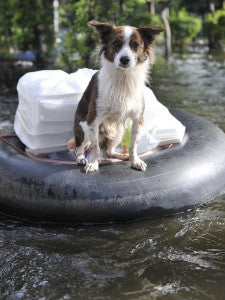
In May 2011, storms and spring runoff combined to produce some of the worst flooding in a century in Memphis, Tennessee. The local government ordered more than
1,300 homes evacuated.
Some people had to evacuate so fast they left their pets behind. Others took pets but found housing them in hotels was costly – if allowed at all. The American Humane Association, which sponsors an animal rescue group that travels to emergencies, reported it took in 187 animals. It pulled 50 of them from the flooding, including a cat that bore four kittens after its rescue.
When preparing your family for emergencies, don’t forget pets. Preparing pets is just as important.
ID your pet

Your pets should have current ID tags in case you get separated from them. The Humane Society of the United States suggests putting an out-of-state contact on the back of the tag, since an evacuation might force you out of your home. Pets with microchips in them have been found halfway across the country, so if possible, get your pet microchipped and enroll it in a recovery database, said the Humane Society.
“If your pet gets lost, his tag is his ticket home,” said ready.gov.
Once you’ve tagged your pet, make sure you keep its records handy in a waterproof container.
Your pet’s records should include a veterinary history and name of your veterinarian, feeding schedules, medical conditions and behavior issues, in case you have to board your pets apart from you.
You need a current photo of you with your pet along with its description. That can help others Replace your pet and prove it’s yours if you get separated.
Make a pet disaster kit
“Keep in mind that what's best for you is typically what's best for your animals,” said ready.gov.
Pets need disaster kits just like people do.
The Humane Society of the United States has a
great checklist for a pet disaster kit.
It suggests packing food and water for five days (check out our freeze-dried pet food, great for long-term storage). Remember a can opener. Though your pet doesn’t need a gallon of water per day, the checklist recommends keeping an extra gallon of water on hand to clean your pet if it gets exposed to chemicals or flood water. You also need equipment to collect pet waste: a cat litter box with litter and a scoop and garbage bags.

You should have first aid supplies for your pets as well as for your family, including medicines and a pet first aid book.
“There are many minor injuries you can deal with at home before going to a vet, especially in an emergency or when you can't get in to see a doctor quickly,” wrote Deann Shepherd, director of communications for the Humane Society of Utah in an email.
A pet could end up staying in a carrier for hours or longer. The Humane Society of the United States recommends a carrier large enough to allow a pet to stand comfortably, turn around and lie down. Small pets should have a secure cage with blankets or towels for warmth and any species-specific needs. Also bring leashes or harnesses. If possible, a pet’s bed and toys from home are useful to reduce its stress.
Other useful items include paper towels, trash bags, grooming items, and bleach.
Replace a safe place to stay
Most shelters won’t take pets. See if you can arrange for friends or relatives outside your immediate area to shelter you and your pets, the Humane Society said. If you have more than one pet, you may need to house them in separate places. A kennel or vet’s office might board your pets. Or, though this will be more costly, you can track down a pet-friendly hotel.
The Humane Society has a
list of online resources for pet-friendly hotels, reproduced below. Be aware that many hotels will have a pet surcharge.
Replace Pet Friendly Hotels:
Bringfido.com
Dogfriendly.com
Doginmysuitcase.com
Pet-friendly-hotels.net
Pets-allowed-hotels.com
Petswelcome.com
Tripswithpets.com
As a last resort, ask your local animal shelter if its staff can watch your pet, the Humane Society said. However, be aware that shelters often have limited resources.
Plan for your pet in case you're not home
Ask a neighbor or nearby family member to take your pets if you’re not at home when there’s a disaster. Give that person a key and show them where your pets are likely to hide and where you keep emergency supplies. Make sure that person knows your pets and vice-versa.
What solutions have you come up with for preparing pets for disasters? Tell us in the comments!
 In May 2011, storms and spring runoff combined to produce some of the worst flooding in a century in Memphis, Tennessee. The local government ordered more than 1,300 homes evacuated.
Some people had to evacuate so fast they left their pets behind. Others took pets but found housing them in hotels was costly – if allowed at all. The American Humane Association, which sponsors an animal rescue group that travels to emergencies, reported it took in 187 animals. It pulled 50 of them from the flooding, including a cat that bore four kittens after its rescue.
When preparing your family for emergencies, don’t forget pets. Preparing pets is just as important.
ID your pet
In May 2011, storms and spring runoff combined to produce some of the worst flooding in a century in Memphis, Tennessee. The local government ordered more than 1,300 homes evacuated.
Some people had to evacuate so fast they left their pets behind. Others took pets but found housing them in hotels was costly – if allowed at all. The American Humane Association, which sponsors an animal rescue group that travels to emergencies, reported it took in 187 animals. It pulled 50 of them from the flooding, including a cat that bore four kittens after its rescue.
When preparing your family for emergencies, don’t forget pets. Preparing pets is just as important.
ID your pet
 Your pets should have current ID tags in case you get separated from them. The Humane Society of the United States suggests putting an out-of-state contact on the back of the tag, since an evacuation might force you out of your home. Pets with microchips in them have been found halfway across the country, so if possible, get your pet microchipped and enroll it in a recovery database, said the Humane Society.
“If your pet gets lost, his tag is his ticket home,” said ready.gov.
Once you’ve tagged your pet, make sure you keep its records handy in a waterproof container.
Your pet’s records should include a veterinary history and name of your veterinarian, feeding schedules, medical conditions and behavior issues, in case you have to board your pets apart from you.
You need a current photo of you with your pet along with its description. That can help others Replace your pet and prove it’s yours if you get separated.
Make a pet disaster kit
“Keep in mind that what's best for you is typically what's best for your animals,” said ready.gov.
Pets need disaster kits just like people do.
The Humane Society of the United States has a great checklist for a pet disaster kit.
It suggests packing food and water for five days (check out our freeze-dried pet food, great for long-term storage). Remember a can opener. Though your pet doesn’t need a gallon of water per day, the checklist recommends keeping an extra gallon of water on hand to clean your pet if it gets exposed to chemicals or flood water. You also need equipment to collect pet waste: a cat litter box with litter and a scoop and garbage bags.
Your pets should have current ID tags in case you get separated from them. The Humane Society of the United States suggests putting an out-of-state contact on the back of the tag, since an evacuation might force you out of your home. Pets with microchips in them have been found halfway across the country, so if possible, get your pet microchipped and enroll it in a recovery database, said the Humane Society.
“If your pet gets lost, his tag is his ticket home,” said ready.gov.
Once you’ve tagged your pet, make sure you keep its records handy in a waterproof container.
Your pet’s records should include a veterinary history and name of your veterinarian, feeding schedules, medical conditions and behavior issues, in case you have to board your pets apart from you.
You need a current photo of you with your pet along with its description. That can help others Replace your pet and prove it’s yours if you get separated.
Make a pet disaster kit
“Keep in mind that what's best for you is typically what's best for your animals,” said ready.gov.
Pets need disaster kits just like people do.
The Humane Society of the United States has a great checklist for a pet disaster kit.
It suggests packing food and water for five days (check out our freeze-dried pet food, great for long-term storage). Remember a can opener. Though your pet doesn’t need a gallon of water per day, the checklist recommends keeping an extra gallon of water on hand to clean your pet if it gets exposed to chemicals or flood water. You also need equipment to collect pet waste: a cat litter box with litter and a scoop and garbage bags.
 You should have first aid supplies for your pets as well as for your family, including medicines and a pet first aid book.
“There are many minor injuries you can deal with at home before going to a vet, especially in an emergency or when you can't get in to see a doctor quickly,” wrote Deann Shepherd, director of communications for the Humane Society of Utah in an email.
A pet could end up staying in a carrier for hours or longer. The Humane Society of the United States recommends a carrier large enough to allow a pet to stand comfortably, turn around and lie down. Small pets should have a secure cage with blankets or towels for warmth and any species-specific needs. Also bring leashes or harnesses. If possible, a pet’s bed and toys from home are useful to reduce its stress.
Other useful items include paper towels, trash bags, grooming items, and bleach.
Replace a safe place to stay
Most shelters won’t take pets. See if you can arrange for friends or relatives outside your immediate area to shelter you and your pets, the Humane Society said. If you have more than one pet, you may need to house them in separate places. A kennel or vet’s office might board your pets. Or, though this will be more costly, you can track down a pet-friendly hotel.
The Humane Society has a list of online resources for pet-friendly hotels, reproduced below. Be aware that many hotels will have a pet surcharge.
Replace Pet Friendly Hotels:
Bringfido.com
Dogfriendly.com
Doginmysuitcase.com
Pet-friendly-hotels.net
Pets-allowed-hotels.com
Petswelcome.com
Tripswithpets.com
As a last resort, ask your local animal shelter if its staff can watch your pet, the Humane Society said. However, be aware that shelters often have limited resources.
Plan for your pet in case you're not home
Ask a neighbor or nearby family member to take your pets if you’re not at home when there’s a disaster. Give that person a key and show them where your pets are likely to hide and where you keep emergency supplies. Make sure that person knows your pets and vice-versa.
What solutions have you come up with for preparing pets for disasters? Tell us in the comments!
You should have first aid supplies for your pets as well as for your family, including medicines and a pet first aid book.
“There are many minor injuries you can deal with at home before going to a vet, especially in an emergency or when you can't get in to see a doctor quickly,” wrote Deann Shepherd, director of communications for the Humane Society of Utah in an email.
A pet could end up staying in a carrier for hours or longer. The Humane Society of the United States recommends a carrier large enough to allow a pet to stand comfortably, turn around and lie down. Small pets should have a secure cage with blankets or towels for warmth and any species-specific needs. Also bring leashes or harnesses. If possible, a pet’s bed and toys from home are useful to reduce its stress.
Other useful items include paper towels, trash bags, grooming items, and bleach.
Replace a safe place to stay
Most shelters won’t take pets. See if you can arrange for friends or relatives outside your immediate area to shelter you and your pets, the Humane Society said. If you have more than one pet, you may need to house them in separate places. A kennel or vet’s office might board your pets. Or, though this will be more costly, you can track down a pet-friendly hotel.
The Humane Society has a list of online resources for pet-friendly hotels, reproduced below. Be aware that many hotels will have a pet surcharge.
Replace Pet Friendly Hotels:
Bringfido.com
Dogfriendly.com
Doginmysuitcase.com
Pet-friendly-hotels.net
Pets-allowed-hotels.com
Petswelcome.com
Tripswithpets.com
As a last resort, ask your local animal shelter if its staff can watch your pet, the Humane Society said. However, be aware that shelters often have limited resources.
Plan for your pet in case you're not home
Ask a neighbor or nearby family member to take your pets if you’re not at home when there’s a disaster. Give that person a key and show them where your pets are likely to hide and where you keep emergency supplies. Make sure that person knows your pets and vice-versa.
What solutions have you come up with for preparing pets for disasters? Tell us in the comments!

4 comments
Skip
Personally, I keep at least a month’s supply of dog food (dry and canned) along with medications including vet antibiotics, dewormers, heartworm & flea/tick preventatives, etc. for my dogs. Also keep extra water. The Merck Vet index is great for checking out symptoms & Plumb’s Vet drug Handbook are both standards in vet offices. You do have to keep relatively current on the books but still worth the expense. Of course my dogs are chipped too. I like the idea of keeping photos of yourself & pet, & sip Locke copies of records.
Kathy Jo
The American Red Cross has a great program on First Aid for your pets. This is a great class for anyone with either cats or dogs. Well worth your time!
Victoria Edmondson
Karen, please contact your county Senior Services office. They may have resources to assist you and your situation. Also, I’m not LDS but have found their local missionaries more than willing to help me with heavy household chores. God Bless!
Karen M.
I am a 77 year old widow . I am home bound which limits the number(very few) of contacts that I can access. I am I am unable to drive, and of course do not have a car, There are only 2 members of my family remaining, and due to their location and serious physical challenges they are not available My income is my Social Security check.
I live within 5 miles of the South Carolina coast.
I have 3 darling companions, Two under 5 lb, puppy girls(each 10 yrs. old) and one 4 yr old Precious Kitty! They ARE my everything.
I live in a first floor apartment.
Whatever disaster happens, natural or man made, I will not evacuate. If there is an evacuation called, it will more than likely include a 50-100 mile radius where I live. I will not leave my girls. How can anyone place their pets in a room, look them in the eye and say-
sorry guys, but it,s not safe here for me but I am going to a shelter where you all can,t go. No way in h—-!! We are a team. Whatever the outcome for one is the out come for all four.
I have life vests for all 3, and am going to get one for my self. If they would become necessary, I plan to use paracord and tie us all together. I would put their harnesses on under the life vests. Should that become necessary that would hopefully keep us a float until someone finds us. They all are micro-chipped, and have i.d. tags. If I could afford an inflatable
raft, I would, just in case. The girls each have their own hard crates. They also have the zip mesh play pens. The puppy girls( Dottie and Sissie)would share one. It’s big enough for food, water,toys, a bed, and of course puppy pad! Precious Kitties’ is big enough for food, water toys, and her covered litter pan. If we get some flooding into the apartment, I plan to put the extra leafs in my dining room table. That makes it large enough for both pens side by side. The pens will be fastened to the table with bungee cords and paracord. The table is very old, solid wood, and it’s younger days wold seat 12 easily!
I think that if we can manage,( God willing) to stay in place,we will be okay no matter how difficult.
If you all have any thoughts or suggestions about anything that will make things better and easier on my three girls, I would be most appreciated. I have to admit that this whole thing frightens me for my babies.
Note of interest, my girls are all rescue babies!!
Take care and God bless.
Be safe
Thanks for all you do.
Karen